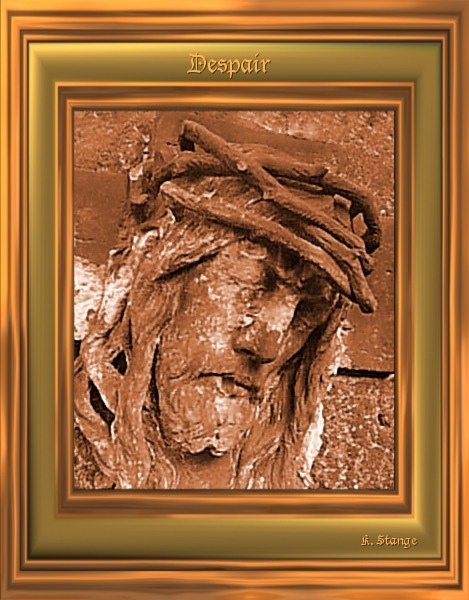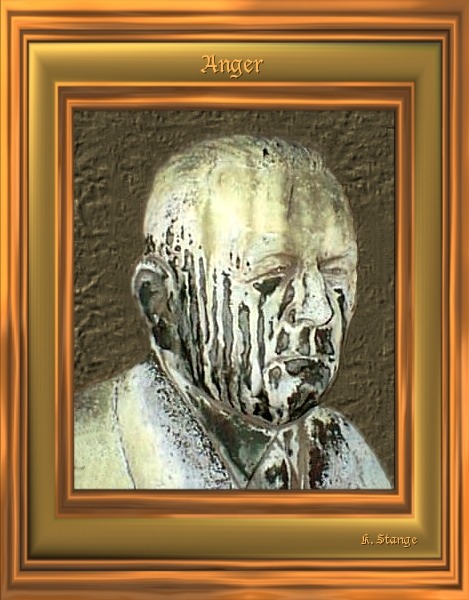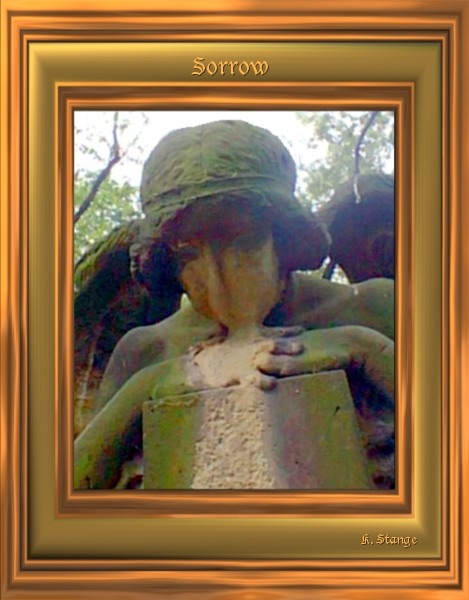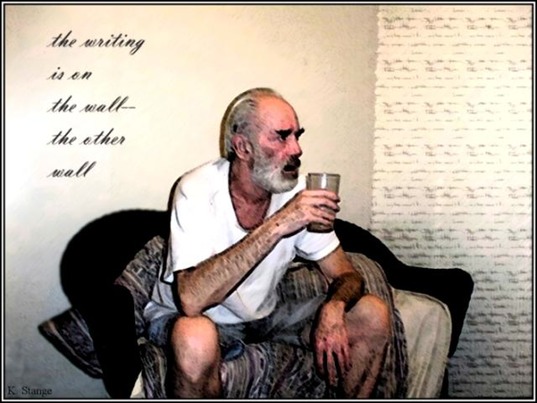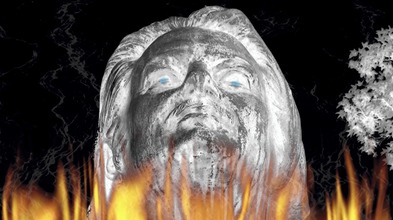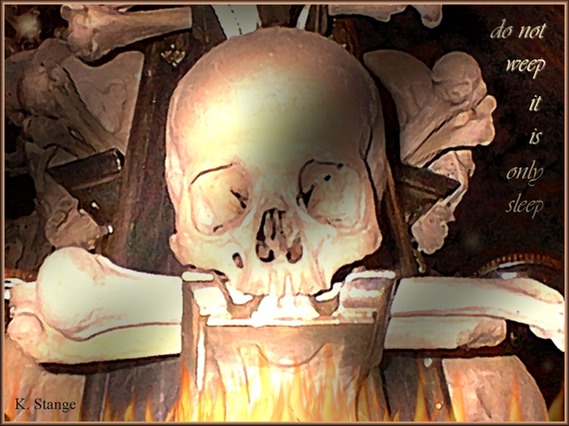Your Man Friday’s Ideas: Our Plastic Brains
Your Man Friday’s Ideas: Our Plastic Brains
Neuroscientists are offering support for George Burns’ contention that “You can't help getting older, but you don't have to get old.” It seems you actually can teach old dogs new tricks. Neuroplasticity is the term used to describe our brains’ flexibility: its ability to wire and rewire its neural circuits. Once it was thought that this was only a characteristic of the youthful brain, just as it was believed we were born with a certain number of functioning neurons that gradually died off as we aged. Now it is known that our brains retain their plasticity for our whole lives, and we can even create new neurons—a process called neurogenesis.
Man Friday links here:
http://kenstange.com/yourmanfriday/?p=1443
The Poetry In Science
The Poetry In Science
My writing, including my poetry, is heavily influenced by science, because science has been so instrumental in opening up vistas into worlds far beyond quotidian experience. The universe that science has unveiled to us is a profound source of inspiration for those who haven’t had their minds closed and locked by religion or any other dogma. One of my excellent students in my Psychology of Art class included in her reflective journal for the course this link to a video called “Science Saved My Soul” that is beautifully poetic in its appreciation of this fact.
The Egos Of Poets, Scientists, And Cranks
The Egos Of Poets, Scientists, And Cranks
“Poets are usually egocentric for the same reason that scientists and cranks are: they believe they have something special to say that is important to other people. Like scientists, but unlike cranks, sometimes they are right.” –Hippokrites
This makes sense, because both poets and scientists are exposing themselves to criticism, even ridicule. Most people are ignorant about poetry and science. So the poet or scientist has to be sufficiently egocentric as not to give a shit what most people think. Of course, they can’t help but care deeply what their informed public thinks. Poets care about the critical reader’s evaluation of their work. Scientists care about their knowledgeable colleagues’ response to their work. This explains the apparent paradox of being labeled as egocentric, while still being accused of having a fragile ego.
This doesn’t apply to cranks, of course. They don’t have fragile egos. They just know they are right and everyone who doesn’t endorse them has to be a fool.
The Presumption Of Poems (And Those Who Write Them)
The Presumption Of Poems (And Those Who Write Them)
“Good poems presume great
readers. The presumption of great poems
is boundless.”
–Hippokrites.
“Do not read, as children do, to amuse yourself, or like the ambitious, for the purpose of instruction. No, read in order to live.” ―Gustave Flaubert
The War With Words
The War With Words
“Every poem is a battle scar, for language is a vicious combatant.” –Hippokrites.
And many die in battle. Among those is Sylvia Plath who rose from the dead several times, but not the last time. Here is her poem “Lady Lazarus”.
Give Thanks
Give Thanks
“Two things to be grateful for: poets accomplish poems; and poems accomplish nothing.” –Hippokrites.
“It is difficult to get the news from poems, yet men die miserably every day for lack of what is found there.” ― William Carlos Williams
Your Man Friday's Ideas: Live Free Or Die
Your Man Friday's Ideas: Live Free Or Die
That is the slogan on the New Hampshire license plates. It’s meaning is rather ambiguous, but it certainly sounds threatening. In fact, what constitutes ‘freedom’ is itself ambiguous. It seems there are many different ideas about what it means to be free. The United Nations “Universal Declaration of Human Rights” seems to be the most widely accepted way of defining freedom, but its interpretation is far from universally agreed upon. As just one example, Article 26 includes the statement that “Elementary education shall be compulsory.” ‘Compulsory’ isn’t a word normally associated with freedom. Of course this is intended for the good of children, but even this statement confirms in many people their fear that the biggest threat to individual freedom comes from those who are so concerned with what is good for others that they will legislate away other people’s fundamental freedoms.
Man Friday links here:
Hats Off To Alice Munro: Nobel Laureate in Literature
Hats Off To Alice Munro: Nobel Laureate in Literature
Canadian writers and readers are celebrating this week, basking in a little reflected glory and a bit of literary nationalist pride. The last time a Canadian won the Nobel Prize for Literature was way back in 1976, when it was awarded to Saul Bellow, and he is only considered Canadian because he was born in Quebec. His family moved to Chicago when he was nine, and his fiction is largely about urban, intellectual life there. By contrast, Alice Munro’s work is Canadian to the core, often set in small Canadian towns and about ‘ordinary’ people’s lives.
Alice Munro has won so very many prestigious literary awards, it really shouldn’t be a surprise that the Nobel committee has chosen her. She is 82 years old and claims she will write no more, so this is a most fitting, and aptly timed, crowning reward for a lifetime of achievement.
I regret to say I’ve only read a small number of her stories, but I intend to correct that oversight. The most important reward for literary prizes isn’t the money: it is that it sends people back to read the writer. I’m sure readership is the best legacy any writer could want.
Alice Munro: A Sample
Alice Munro: A Sample
This from her last collection, Dear Life.
“When my mother was growing up, she and her whole family would go to dances...”
http://www.telegraph.co.uk/culture/books/10369478/Nobel-Prize-2013-Alice-Munro-exclusive-story.html
Thanks Given For Not Being A Fowl
Thanks Given For Not Being A Fowl
It’s Thanksgiving Day here in Canada. I like the idea of a day devoted to giving thanks. Of course I don’t feel I’m giving thanks to some imagined deity. I guess you might say I am thanking the universe and evolution for giving me my wonderful existence and this awe-inspiring universe. And I’m thanking all artists and scientists who have so enriched my existence by their creative accomplishments.
Of course, my way of allegedly giving thanks on Thanksgiving doesn’t involve any charitable action. It just consists of excessive amounts of food, especially turkey, which I love. But, hey, then I also thank my wife for cooking yet another turkey for this turkey. (She’s been counting how many turkeys she’s served up over our many years and frequently reminds me of the count. So I try hard to show my appreciation. I want those turkeys to keep coming.)
I’m also grateful that I’m not literally a turkey. It can’t be the high point of their year. Here are some other fowls’ thoughts on being dinner and also on politicians and religious ‘leaders’.
http://elephantintheroom.ca/bare-truth/04-Political%20Promises.html
http://elephantintheroom.ca/bare-truth/02-Chicken%20Dinner.html
The Loneliness Of The Long Distance Writer
The Loneliness Of The Long Distance Writer
Alice Munro gave as one of her reasons for retiring from writing as her desire to spend her remaining years in the company of other people. Writing is a very lonely activity.
We are social animals, so writing might be considered a sign of pathology, because writing really just consists of a conversation with imaginary friends. (Most well adjusted adults have given up their imaginary friends.) The advantage to this childishness is that you get to dominate the conversation. The disadvantage is that you really are just talking to yourself. And even when you eventually publish your efforts, you don’t know how many real people are listening to your monologue—or if they really are your friends.
The other arts are different. Their creation doesn’t require being alone in a room with imaginary friends and imaginary characters. Proust alone in his cork-lined room writing his Remembrance of Things Past (A La Recherche du Temps Perdu) is archetypal. It’s ironic that writers are often seen as extroverts. This misperception is an example of selective sampling. Writers try to make the most of their time away from their voluntary, solitary confinement to get their social fix and gather material—and that is the only time most people see them. No real extrovert could be a writer.
I expect the next edition of the DMS (the psychiatric diagnosis manual) will include “Writing Obsessive Disorder”. But if they come up with some drug to treat it, I’ll behave like those schizophrenics you see downtown talking to themselves: I won’t take my meds.
Read About God When He’s Drunk
So Many Books, So Little Time!
So Many Books, So Little Time!
Reading is the bane of writers. First, it is a time consuming addiction. Secondly, it is humiliating and discouraging, for there is so very much incredibly good writing, one is bound to feel inadequate. Yet it is a necessary addiction.
It is hard to imagine anyone writing anything of worth without having spent more time reading than writing. “There would be a lot less bad writing if more people opened a few books before they opened their notebooks.” (Hippokrites)
And one can’t strive for greatness at anything without knowing what is great. I can’t remember what writer said that every time he sat down to write he felt he was in competition with Shakespeare. He said he was well aware of how hopelessly outclassed he was, but it nevertheless made him try harder and thus do better.
Your Man Friday’s Ideas: Combinatorial Art
Your Man Friday’s Ideas: Combinatorial Art
Certainly the most popular subjects for visual art are landscapes, nature, and portraits. In literature, among the most popular subjects are death and the characters. Here are some collections of visual art based on the idea of combining these obsessions.
Man Friday links here: http://kenstange.com/yourmanfriday/?p=1459
To Dream Or Not To Dream
To Dream Or Not To Dream
“If one accepts that death is the 'big sleep', what really matters is whether one has dreams or not—and what is the nature of those dreams.” —Hippokrites
The Reason For Nightmares
The Reason For Nightmares
Freud had his theories about the function of dreams, and one was wish fulfillment. So how then explain nightmares?
Neuroscientists have a variety of theories about the function of dreams, including memory consolidation and restoration of efficient cortical functioning. So how then explain nightmares?
“Nightmares are the metaphors one's conscience uses to communicate with one's consciousness. —Hippokrites. So how then explain why everyone doesn’t have nightmares? Who does not have a guilty conscience?
Writers’ Bad Nights
Writers’ Bad Nights
“Insomnia is the ultimate torture chamber, because sleep is the only escape.” —Hippokrites
They say that misery loves company. That is true, but it’s not because we wish ill to others. It’s just because we are social animals, and so there is something inherently comforting about knowing others share our feelings. (Similarly, we also enjoy our joys more when we can share them.)
So I find it somehow comforting to know my affliction is so widely shared by other writers.
"On the Edge of an Abyss": The Writer as Insomniac” by Greg Johnson
http://www.vqronline.org/articles/1990/autumn/johnson-on-edge/
Your Man Friday’s Ideas: Counting To Infinity
Your Man Friday’s Ideas: Counting To Infinity
Math has a bad rep, and it’s unjustified. It may be true that it takes a little effort to appreciate its wonders, but that is true of all the arts and sciences as well. The more you know about anything, the deeper your appreciation.
Your Man Friday links here: http://kenstange.com/yourmanfriday/?p=1465
Prescription: A Tincture Of Madness
Prescription: A Tincture Of Madness
“There was never a genius without a tincture of madness…” —Aristotle
“Insanity - a perfectly rational adjustment to an insane world.” —R. D. Laing
If You’re Seeing Things
If You’re Seeing Things
“If you see things others don’t see, you could be mad. Or you just could have better eyesight.” —Hippokrites
My wife has suggested that a good definition of intelligence would be the ability to see relationships. I agree. It’s also a good definition of creativity, but then I don’t draw a big distinction between intelligence and creativity, for certainly creativity is a component of intelligence. Perhaps one could simply add one word to make this definition more specifically about creativity: intelligence is the ability to see new relationships.
Metaphor is the not-so-secret ingredient in creativity. And what is metaphor but the ability to find unsuspected and unusual relationships between apparently unrelated things? This is true of not just art, but science as well. Isn’t that what Einstein did when he realized that free falling in an elevator was the same as floating in orbit? And so gave us the General Theory Of Relativity.
Eve Of Destruction, Dawn Of Creation
Eve Of Destruction, Dawn Of Creation
“Every act of creation is first an act of destruction.” —Pablo Picasso
One has to take things apart to see what makes them tick—and to find a new way to put the parts back together. So it’s not surprising that some creative people are self-destructive.
T.S. Elliot Got It Wrong
T.S. Elliot Got It Wrong
Seasons’ changes affect me profoundly, and that in turn affects my writing. But at least I am in good company.
T.S. Elliot begins The Wasteland with the famous line, “April is the cruellest month.”
However, I think he got the month wrong. At least here in the North, November is the cruellest month. And this year, unlike last, November is jumping the gun. It is still October, but most days it looks and feels like November. Stark, bleak, gray.
It almost makes me wish for winter, and its bright blanket of snow glistening in the crisp, crystalline sunshine. One can just cosy up in one’s study and admire it out the window, with no outdoor chores nagging at your conscience.
As Elliot, apparently nostalgic for winter, writes a few lines later…
“Winter kept us warm, covering
Earth in forgetful snow, feeding
A little life with dried tubers…”
(Don’t get me wrong. I’m no fan of winter and its associated hassles. And one can’t just hibernate indoors till spring comes.)
But April, and the warm spring days it heralds, isn’t cruel. Yes, it is true that spring in Northern Ontario isn’t a exactly a treat for the senses, for the warming temperatures bring us the filthy, gray remains of winter’s snow banks and the aroma of melting dog shit. But nevertheless I always welcome it.
No, April isn’t the cruellest month. November is.
November Cometh
November Cometh
I see my impression of November is shared.
November
http://www.poemhunter.com/poem/november-2/
Autumn Blues (in general)
Windigo Spirit
Windigo Spirit
Trick or treat!
Halloween is the time for ghost stories. Here is one from my early novel, Bushed, about wintering alone in the North.
